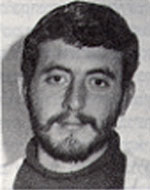Raymond, son of Naomi and Reuven, was born on April 4, 1947 in Johannesburg, South Africa, and immigrated to Israel in 1969. He attended the Orange Grove Elementary School and the Northway and Greenside High School in his hometown and graduated from the University of Witwatersrand in Johannesburg where he received a BA in Economics and Law. He was an outstanding student at all stages of his studies; At the elementary school he was “promoted” to a higher class, completed high school with honors and received a bachelor’s degree in economics when he was nineteen. He was an athlete, excelled as a tennis player and played on the team of schools he had attended. He was also a musician and played guitar well, composed melodies and composed songs and stories. He was naturally pleasant and noble, he beleived in Peace and love and he mentioned it in his poems too. After returning to Israel as a volunteer in 1967, after completing his military service in South Africa as a law officer, he returned to his hometown and worked in a good position in a large company in Johannesburg. He spent a year at Kibbutz Maayan Tzvi and was later employed in earthworks in Sinai before settling in Kibbutz Ein Dor. He loved his work in the groves and was friendly and sympathetic to his friends, whom they nicknamed “Rafi.” He helped others, volunteered frequently to do the work of others and always wanted to encourage his friends, in all kind of things or poetry, with his guitar, which he never separated from. In 1972, he married a girl from his country, Nesta, and began to work in the plantation, after completing a course at Midreshet Ruppin. Raymond was drafted into the Israel Defense Forces in late April 1973 and assigned to the Artillery Corps, where he underwent an artillery training course and was assigned to a unit in the Sinai in the role of an artillery and mortar operator, Eight years, they wrote about him: “He was so quiet, unobtrusive. At first we knew nothing about him, not even that he was good at guitar. When we realized by chance, he was no longer restless. He was better than a team or a military band. When it was a little sad in our hearts, we would gather around him and sing, or just listen to him. “On Yom Kippur 5710 (1973), Rafi fought with his unit as a mortar crew at the” Budapest “post on the canal’s edge. The outpost was attacked when the Egyptian offensive was launched and in the shelling Raymond was hit and killed. He was brought to eternal rest in the cemetery at Kibbutz Ein Dor. A friend of mine, who fought alongside him, wrote: “Rafi was with the guitar when the bombardment started, and our battery was hit right away, we saw the Egyptians coming, and there were tanks, and I ran with Rafi to the mortar. We did not have to talk to each other because we knew exactly what was in store for us, and each time someone else went to fetch ammunition, and suddenly a shell hit us, a direct hit. The unit commander wrote that Rafi had fallen heroically. He left behind a wife and parents, who live in India. After his fall, he was promoted to corporal. His wife and his kibbutz published a pamphlet in his memory, which included the words from friends about his character. His friends wrote about him: “It’s hard to talk about Rafi, who is so much for everyone out there and so much for himself, the songs, the silences, the pipe and the smile in his eyes, the juicy Hebrew and the quiet voice. when the guys were lazy – Rafi always volunteered to do it, he was so organized that he was appointed to be responsible for various tasks How could we talk about Rafi and he did not like to talk a lot, and always preferred the silence, the release of laughter and the connection of the smile? Rafi spoke for himself – he sang for himself. “The booklet also contains songs by Rafi, and in a poem dedicated to peace, he wrote:”One-day peace may come, but the world is not ready today; …(see full poem in hebrew)
